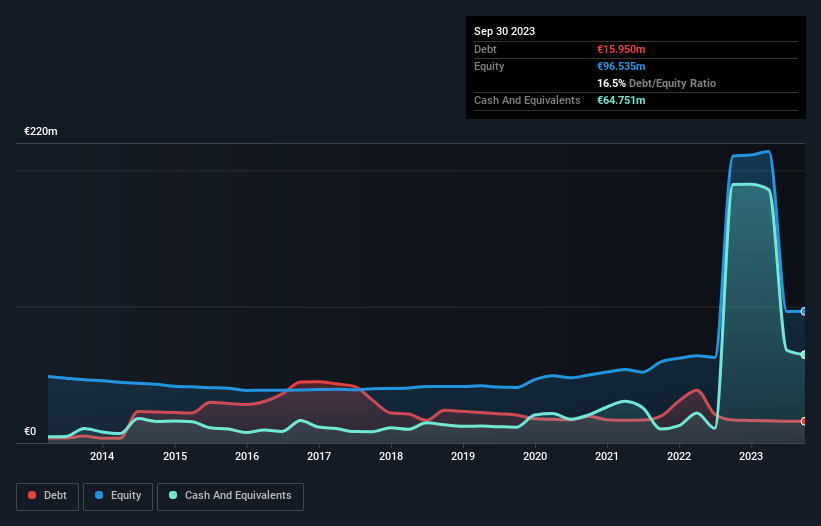
Legendary fund manager Li Lu (who Charlie Munger backed) once said, 'The biggest investment risk is not the volatility of prices, but whether you will suffer a permanent loss of capital.' It's only natural to consider a company's balance sheet when you examine how risky it is, since debt is often involved when a business collapses. As with many other companies 3U Holding AG (ETR:UUU) makes use of debt. But should shareholders be worried about its use of debt?
What Risk Does Debt Bring?
Debt and other liabilities become risky for a business when it cannot easily fulfill those obligations, either with free cash flow or by raising capital at an attractive price. Part and parcel of capitalism is the process of 'creative destruction' where failed businesses are mercilessly liquidated by their bankers. However, a more common (but still painful) scenario is that it has to raise new equity capital at a low price, thus permanently diluting shareholders. By replacing dilution, though, debt can be an extremely good tool for businesses that need capital to invest in growth at high rates of return. When we think about a company's use of debt, we first look at cash and debt together.
View our latest analysis for 3U Holding
What Is 3U Holding's Debt?
As you can see below, 3U Holding had €16.0m of debt at September 2023, down from €16.9m a year prior. However, it does have €64.8m in cash offsetting this, leading to net cash of €48.8m.

How Healthy Is 3U Holding's Balance Sheet?
Zooming in on the latest balance sheet data, we can see that 3U Holding had liabilities of €12.8m due within 12 months and liabilities of €18.8m due beyond that. On the other hand, it had cash of €64.8m and €5.43m worth of receivables due within a year. So it actually has €38.6m more liquid assets than total liabilities.
This surplus strongly suggests that 3U Holding has a rock-solid balance sheet (and the debt is of no concern whatsoever). Having regard to this fact, we think its balance sheet is as strong as an ox. Succinctly put, 3U Holding boasts net cash, so it's fair to say it does not have a heavy debt load! When analysing debt levels, the balance sheet is the obvious place to start. But ultimately the future profitability of the business will decide if 3U Holding can strengthen its balance sheet over time. So if you want to see what the professionals think, you might find this free report on analyst profit forecasts to be interesting.
Over 12 months, 3U Holding made a loss at the EBIT level, and saw its revenue drop to €48m, which is a fall of 26%. To be frank that doesn't bode well.
So How Risky Is 3U Holding?
Although 3U Holding had an earnings before interest and tax (EBIT) loss over the last twelve months, it made a statutory profit of €1.6m. So when you consider it has net cash, along with the statutory profit, the stock probably isn't as risky as it might seem, at least in the short term. There's no doubt the next few years will be crucial to how the business matures. There's no doubt that we learn most about debt from the balance sheet. But ultimately, every company can contain risks that exist outside of the balance sheet. For example 3U Holding has 5 warning signs (and 2 which shouldn't be ignored) we think you should know about.
If, after all that, you're more interested in a fast growing company with a rock-solid balance sheet, then check out our list of net cash growth stocks without delay.
Valuation is complex, but we're here to simplify it.
Discover if 3U Holding might be undervalued or overvalued with our detailed analysis, featuring fair value estimates, potential risks, dividends, insider trades, and its financial condition.
Access Free AnalysisHave feedback on this article? Concerned about the content? Get in touch with us directly. Alternatively, email editorial-team (at) simplywallst.com.
This article by Simply Wall St is general in nature. We provide commentary based on historical data and analyst forecasts only using an unbiased methodology and our articles are not intended to be financial advice. It does not constitute a recommendation to buy or sell any stock, and does not take account of your objectives, or your financial situation. We aim to bring you long-term focused analysis driven by fundamental data. Note that our analysis may not factor in the latest price-sensitive company announcements or qualitative material. Simply Wall St has no position in any stocks mentioned.
About XTRA:UUU
3U Holding
Provides telecommunication and information technology services in Germany and internationally.
Excellent balance sheet with reasonable growth potential.


